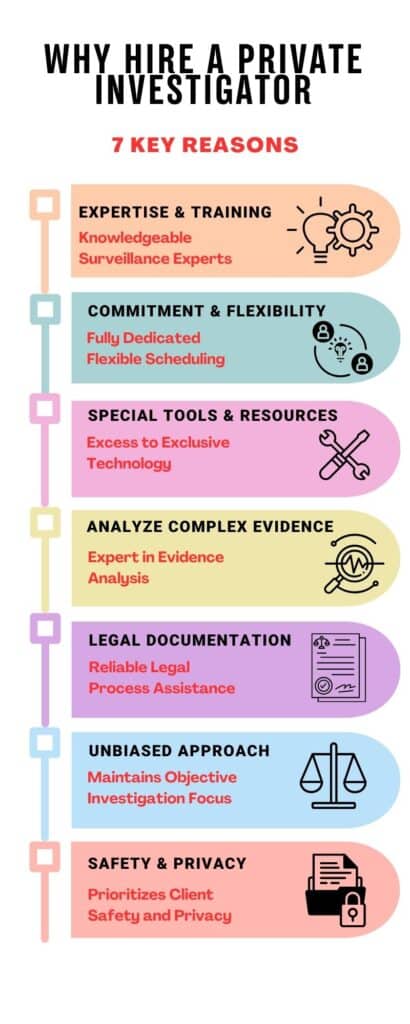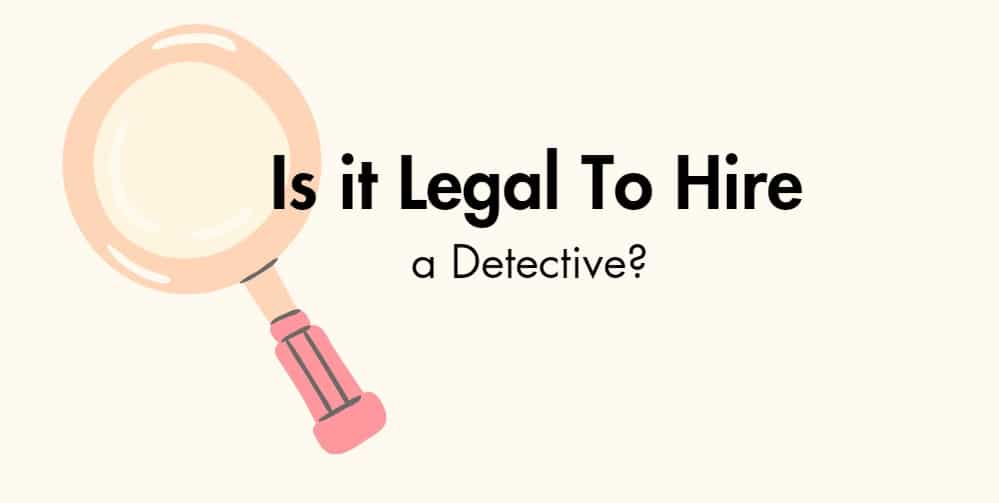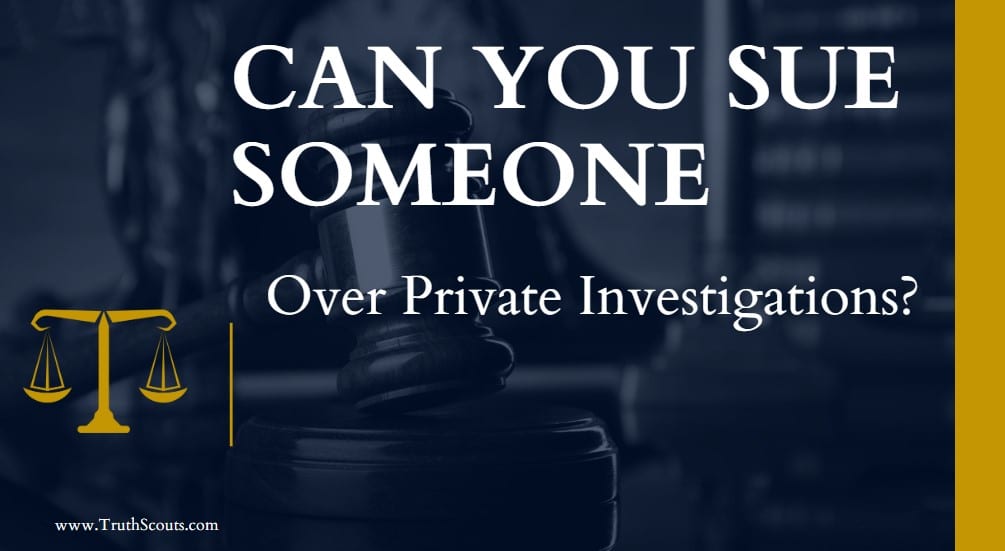This 6-step guide will cover everything you need to know about how to hire a private investigator near you if you live in the USA.
Hiring a private investigator (PI) is about finding a professional problem-solver with the skills to uncover hard-to-find information. A PI can be incredibly useful, whether it’s a personal matter or a business dilemma.
DISCLAIMER: This content is for informational purposes only and not intended as legal advice. Please consult with a legal professional for any legal concerns or questions you may have prior to hiring an investigator.
What is a Private Investigator?
A private investigator, or PI, is someone who carries out investigative and surveillance tasks on behalf of their clients. Their daily tasks can include watching people, gathering proof, or looking into specific situations, whether it’s for a court case, a business concern, or personal reasons.

An important aspect is understanding the difference between private investigators (PIs) and law enforcement officers.
Unlike law enforcement officers whom government agencies employ to tackle criminal cases, PIs are hired by individuals or organizations to collect and provide information, aiming to uncover the truth about private matters. They often work for individuals, private firms, law firms, or insurance companies and specialize in different areas.
When selecting a PI, it’s beneficial to pick someone who has experience relevant to your specific case and possesses the necessary skills for the job.
Get an Instant Cyber Background Check
Prepare to Be Shocked! Search Any Name to Begin.
Why Hire a Private Investigator?
Hiring a private investigator can bring professional insight and dedicated focus to your personal or business matters. These experts stand out for their training and ability to work flexibly around the clock, offering solutions that go beyond the reach of amateurs.
Here are 7 key reasons people hire a private investigator

1. Expertise and Training
Private investigators bring a wealth of knowledge from their backgrounds, often in law enforcement. This allows them to analyze complex legal situations and conduct surveillance discreetly. Their ability to uncover hidden information is enhanced by both their training and real-life experiences.
2. Commitment and Flexibility
Unlike law enforcement officers, who manage multiple cases, a PI dedicates their full attention to your case. They offer flexible scheduling to follow leads anytime, ensuring comprehensive and timely investigations.
Their commitment to your case ensures a level of vigilance and readiness that significantly surpasses what an amateur could offer, making them a valuable ally in your quest for answers.
3. Special Tools and Resources
Private investigators have access to high-tech surveillance equipment and exclusive databases, enabling them to gather evidence in ways the public cannot. They can employ GPS tracking, utilize hidden cameras, and tap into their professional networks for extra expertise, like forensic accounting or DNA analysis
4. Analyze Complex Evidence
The real skill of a PI lies in their ability to sift through and make sense of complex evidence. They’re trained to spot patterns and inconsistencies and synthesize information from various sources into a coherent narrative.
5. Legal Documentation and Testimony
Private investigators play a significant role in legal processes, producing detailed reports and serving as credible witnesses in court. Their professional insights and familiarity with legal standards can be pivotal in legal outcomes.
6. Unbiased Approach
A key benefit of hiring a private investigator is their ability to stay neutral. Unlike friends or family who might have strong feelings about the situation, a PI comes in with a clear head.
This objectivity means they can sift through information, focusing purely on the evidence at hand. Their detachment ensures that the investigation remains unbiased, making sure that the conclusions drawn are based solely on hard facts.
7. Safety and Privacy
Digging into sensitive issues can sometimes be risky, potentially exposing individuals to danger. This is where a private investigator’s expertise becomes invaluable. They are not only trained in handling delicate situations but also prioritize their client’s safety and privacy above all.
By employing professional techniques, they can deal with potentially hazardous scenarios without compromising the confidentiality of the investigation. This dual commitment to safety and secrecy is especially crucial when dealing with matters that require discretion.
What Does a Private Investigator Do?
A private investigator (PI) is a professional skilled in the art of investigation and surveillance. They offer various services tailored to uncover information and provide clarity in various situations.
Here, we outline the diverse services they provide, showcasing the breadth of their capabilities and the numerous situations where they can offer invaluable assistance.
Surveillance
Surveillance is a key service private investigators provide that involves observing people or places. It’s often used to address suspicions of infidelity or business fraud. Private investigators use stealth and technology to gather evidence discreetly, ensuring subjects remain unaware of their presence.

Missing Persons
Locating missing persons is a deeply personal service that extends beyond finding someone; it’s about bringing hope and potentially reuniting families. Using a mix of traditional detective work and modern technology, private investigators tap into extensive networks to find those who have disappeared.
Background Checks
Background checks are increasingly important for vetting new acquaintances, potential employees, or business partners in today’s connected world. Private investigators examine public records, online profiles, and personal networks to create comprehensive profiles and ensure transparency.
Infidelity Investigations
Dealing with suspicions of a partner’s infidelity is emotionally challenging. Private investigators approach these cases with discretion, employing surveillance to gather evidence that helps clients make informed decisions about their relationships.
Child Custody and Divorce Cases
Private investigators collect evidence on parental behavior and fitness in family disputes, such as child custody or divorce. This information can be crucial in court, influencing custody decisions and divorce terms.
Pre-Employment Checks
Ensuring the integrity of potential employees is essential for businesses. Private investigators perform in-depth background checks to verify candidates’ histories and qualifications, helping to avoid hiring mistakes and protect the organization.
Fraud and Theft Investigations
Addressing internal fraud or theft is critical for companies. Private investigators conduct investigations discreetly, uncovering evidence of wrongful activities and allowing businesses to rectify these issues without causing disruption.
Thus, the diverse services offered by private investigators illuminate their crucial role in navigating complex personal and professional challenges. Their ability to discreetly gather evidence and provide clarity makes them an invaluable asset in seeking resolutions, ensuring that truth and justice are brought to the forefront.
How to Hire a Private Investigator: Step-by-Step Guide
Once you know why you need a private investigator (PI) and what to look for, it’s time to start the hiring process. You can begin by looking for local PIs and consider the factors discussed above to find the best one! The next steps are as follows:
Step 1. Locate a Private Investigator Near You.
This step can be done using our free tool. Click your state below to find a private investigator in your area. (anywhere in the USA)

You will be asked a few questions and then directed to the Bark website, which pinpoints the exact type of service you need in your area.
Step 2. Choose Your Specialized Private Investigator
Selecting the right private investigator (PI) is crucial to the success of your inquiry, as many PIs have areas of specialty that cater to different types of investigations. Whether your needs involve a detailed background check, surveillance, or something more unique, finding a PI with extensive experience in a particular field can greatly enhance the effectiveness of the investigation.
Step 3 Arrange The First Meeting
Contact the PIs you’re interested in for a free initial meeting. This is your chance to learn more about them and see if they fit your needs. During this conversation, ask about:
- Their experience with cases like yours.
- How they plan to tackle your case.
- How much do they charge?
- How they protect your privacy.
Before making any decisions, confirm that the PI is licensed and insured. You can find this information on your state or local government’s website. Here is an example in California on how to verify a license. Each state will have its database of licensed detectives.
Step 4: Set Specific Legal Terms
Setting specific legal terms with a private investigator (PI) ensures the investigation is ethical, legal, and aligned with your goals. Here’s a concise approach:
- Define the Scope of Work: Clearly outline the investigation’s objectives, preferred methods, and any off-limits areas.
- Confidentiality Terms: Agree on confidentiality levels, including information storage and sharing protocols.
- Reporting Methods: Establish how and when the PI will report progress and findings to you.
- Payment Terms: Clarify the payment structure, including any additional costs, to avoid surprises.
- Legal Compliance Clauses: Ensure the contract mandates adherence to all relevant laws and regulations.
- Termination Conditions: Spell out conditions under which either party can terminate the contract.
- Consult with a Legal Professional: Review the contract with a lawyer familiar with privacy laws and investigative standards.
- Dispute Resolution: Include a predetermined method for resolving disputes that may arise.
A clear, comprehensive contract is the cornerstone of a successful partnership with your PI.
Step 5: Keep in Touch With Your PI
Maintaining regular communication with your private investigator (PI) is crucial for the investigation’s success. Here’s how to effectively stay in contact:
- Schedule Regular Updates: Agree on a routine schedule for updates to discuss progress, new findings, and any adjustments needed in the investigation strategy.
- Be Available: Ensure your PI has multiple ways to contact you if urgent issues arise or immediate decisions are needed.
- Provide Feedback: Share your feedback on the information and reports provided. This can help steer the investigation more effectively.
- Ask Questions: Don’t hesitate to ask for clarifications about investigative processes or findings. You must understand every aspect of the investigation.
- Be Supportive: Recognize that some investigations take time. Offering support and understanding can foster a productive working relationship.
Step 6: Finalize the Investigation
When the investigation is complete, the PI should provide you with a comprehensive report of their findings, including any evidence they’ve gathered. Be prepared to give them the time they need; a thorough investigation can’t be rushed.
By following these steps, you can hire a PI with confidence, knowing that you’ve done your due diligence to find a professional who can meet your needs.
What is the Cost to Hire a Private Investigator?
According to the US Bureau of Labor Statistics, the median pay for a private investigator was $25.06 per hour. Our research on how much it costs to hire a private investigator in 2024 shows that for a specialized PI the average price is $50 to $100. If you’re dealing with an issue that is overly complicated and requires a higher skill level, that rate jumps to more than $100 per hour. Some investigators offer a set price for an entire case. For example, if you need a basic background check or need to find someone’s address, the cost ranges between $200 to $600.

What You Pay For:
- Surveillance Work: Expect to pay between $50 and $100 per hour. There’s usually a set minimum number of hours you’ll need to pay for.
- Background Checks: A straightforward check will average between $200 to $600. For something more detailed, prices climb over $1000.
- Finding People or Assets: Depending on the case’s complexity, the cost can range from $200 to $1000.
- Investigating Fraud or Financial Matters: These cases require special skills and a lot of time, so they often cost several thousand dollars.
Travel and Mileage Costs
When your private investigator travels for your case, you’ll need to cover their travel costs, which include mileage. Beyond car travel, if the PI needs to go further, even abroad, you’ll also pay for flights, hotels, and meals. Planning for these expenses from the start helps avoid unexpected costs later.
Administrative Expenses
Behind-the-scenes work, including report writing, communication efforts, and meetings, also incurs costs. Some investigators include these in their hourly fees, while others charge separately, highlighting the importance of these tasks in the overall investigation process.
Database Look-Ups
Private investigators use specialized databases to gather information, which is typically charged to the client. The fees vary depending on the database’s specificity and the information required.
Cost of Special Equipment
High-tech equipment like GPS trackers or advanced analysis software can significantly enhance an investigation but will add to the cost. It’s wise to discuss any such needs and their financial implications upfront.
Additional Personnel
Complex cases may necessitate extra hands or specialized experts, leading to higher costs. This ensures a more comprehensive investigation but requires budgeting for additional personnel.
Avoiding Unexpected Charges
The best strategy for managing extra costs is clear communication with your investigator about all potential expenses, from travel to equipment use. Requesting these details in writing as part of your agreement helps in precise budgeting and helps avoid unexpected charges.
By understanding and anticipating these extra charges, you can better prepare for the total investment required when hiring a private investigator. This preparation not only helps in budgeting but also ensures a smooth investigative process, free from financial misunderstandings.
Do Private Investigators Ask for a Retainer?
Private investigators often ask for a payment upfront, known as a “retainer,” before they start working on a case. The size of this retainer can depend on how much work they think your case will need.
Some cases, like looking up information on a computer need a smaller retainer than others that require a lot of watching, like checking if someone is cheating.
Once the investigator starts working, they use the retainer to cover their costs as they come up. They usually update how much of the retainer they’ve used each month until it’s all gone.
If the case needs more work after that, they charge you each month until they’re done. But if they don’t use the whole retainer, they must give you back the part they didn’t use.
Are Private Investigators Legal?
Private investigators play a crucial role in gathering information, but their activities are bound by law to ensure privacy and legal rights are respected. Laws vary across each state; however, many of the things they cannot do are the same across the country. Here’s how laws affecting private investigators vary across the US. Source HG.org Leading Lawyers

North America
In the United States, private investigation is lawful across all states, with most requiring licenses that outline what PIs can and cannot do.
However, states like Idaho, Mississippi, Alaska, and South Dakota have yet to implement specific regulations for private investigators. Despite these variances, there are common rules:
- Public Surveillance: Observing and taking photos of people in public places is generally allowed.
- Property Access: Entering someone’s property without consent is off-limits.
- Wiretapping and Bugging: Listening in on phone calls or placing bugs without a court’s permission is illegal.
- Conduct: Threatening or harassing behavior is prohibited and could lead to criminal charges.
- Illegal Activities: Actions such as break and enter, theft, assault, or impersonation are unlawful.
- Record Access: Gaining access to private records under false pretenses is prohibited.
What Can Private Investigators Do Legally?
In the USA, private investigators can legally conduct background checks, perform surveillance, find missing persons, and gather evidence for legal cases, among other activities. They must operate within the bounds of federal and state laws, avoiding illegal practices such as trespassing on private property, wiretapping without consent, and impersonating law enforcement officers.
Permitted Investigative Techniques
Private investigators can engage in several legal activities, ensuring their methods don’t infringe on individual rights or breach legal protocols. These include:
- Public Surveillance: Watching people in places like parks or streets where they do not expect privacy.
- Public Records Searches: Looking through public databases, like court records or property listings.
- Witness Interviews: Talking to people willing to share information about a case.
- Public Photography and Recording: Capturing images or videos in public spaces.
- Financial and Digital Analysis: Examining financial records or digital data the client provides without breaching confidentiality agreements.
- Pretexting: Using certain deceptive techniques to obtain information, as long as it involves voluntary disclosure and doesn’t involve impersonating someone else.
- Conduct property searches: This is done to locate assets or determine property ownership.
- Background Checks: Conducting checks through legal means to uncover a person’s history.
Off-Limits Activities for Private Investigators
There are clear restrictions on what PIs cannot do, aimed at protecting privacy and preventing harassment:
- Wiretapping: Listening to private conversations without the consent of those involved.
- GPS Tracking: Installing tracking devices on vehicles without the owner’s permission.
- Property Trespassing: Entering someone’s private property without consent.
- Theft of Information: Illegally obtaining documents or electronic data.
- Harassment: Using intimidation or coercion against anyone.
- Impersonating Officials: Pretending to be a police officer or another official to gather information.
- Misrepresentation: Falsely presenting their credentials or the services they can legally provide.
- Hacking: Illegally accessing someone’s digital accounts or databases.
Understanding the legal framework within which PIs operate helps define the scope of their work. It’s this knowledge, combined with ethical practice, that distinguishes professional investigation from unlawful intrusion.
Proper training and experience are essential for PIs to understand these legal waters successfully and to gather information effectively without overstepping legal boundaries.
Please consult with a legal professional for any legal concerns or questions you may have.
Key Things To Consider To Hire a Private Investigator
Hiring a private investigator requires careful consideration to ensure they meet your needs while adhering to ethical and legal standards.
1. Check Qualifications and Experience
Before hiring, it’s crucial to evaluate their professional background:
- Credentials: Confirm their licensing or certification for legality in your region.
- Education and Background: Those with criminal justice or related training or a history in law enforcement can be advantageous.
- Specialization: For specific issues like corporate fraud or marital disputes, choose a PI with relevant expertise.
- Experience: Seasoned investigators will likely understand your case better and know effective strategies.
2. Verify Licensing and Insurance
Make sure the private investigator has the necessary license as per the laws in your area. It’s also important to verify they are insured to safeguard against any liabilities that arise during their investigation.
Holding a license is a requirement for legal operation for private investigators in many places, serving as proof of their authenticity.
3. Understand Costs
Discuss rates early on. Understanding the cost structure upfront can help manage your budget, whether they charge hourly or a flat fee. Remember, the least expensive option isn’t always the best.
4. Ethical Considerations
Ethics matter. A reputable PI will understand legal boundaries carefully, respecting privacy and surveillance laws. Avoid investigators who suggest unethical methods, as this could jeopardize the case and is not legally sound.
5. Check References or Reviews
Search online for the investigator or their agency. Remember, not finding much online can be normal for this kind of secretive work. Ask the investigator for the contact information of three past clients you can talk to. When you contact these references, ask about the investigator’s reliability, work quality, and the outcomes they achieved.
6. Review Their Past Work
Seeing the actual results of the investigator’s past work is key. This could be a detailed report, photos, or videos that might be used in court. These items should be high quality since strong evidence could help settle disputes outside of court.
Good investigators will often offer to show samples of their work. Look for clear, well-documented reports and photos with timestamps. The level of detail in these samples can tell you a lot about the investigator’s thoroughness.
7. Communication and Updates
Having clear, ongoing communication with your investigator is vital. Talk about how you’ll keep in touch and how often you’ll get updates. Regular reports on the investigation’s progress are important to keep you informed.
8. Assess Compatibility
Feeling comfortable with your PI is essential. In your first meeting, gauge their professionalism and empathy as you share sensitive details with them. Trust and mutual understanding are key to a successful partnership.
Selecting the right private investigator involves thorough vetting of their qualifications, ethics, and compatibility with your needs. This ensures they can effectively and legally obtain the information you require.
Can You Sue Someone for Hiring a Private Investigator?
Hiring a private investigator (PI) is generally legal, but there are cases where it can lead to legal issues. Let’s explore when you might have grounds to sue someone for employing a PI against you.

When is Legal Action Justified?
Always consult a private investigation lawyer if you feel you have grounds for legal action. There are specific situations where the actions of a private investigator or the person hiring them could cross legal boundaries, giving you a reason to consider legal action.
1. Invasion of Privacy
You could sue if a PI significantly invades your privacy, such as wiretapping your phone or trespassing on your property without consent. Privacy laws are strict, and this can lead to serious legal consequences.
2. Defamation
You might have a defamation claim if a PI spreads false information about you, damaging your reputation. Truth is a defense against defamation, so the information must be false and harmful.
3. Harassment and Stalking
If the PI’s methods include stalking or harassing you, legal actions such as restraining orders or lawsuits for damages could be possible. Everyone has the right to feel safe and free from intimidation.
4. Violating Federal Laws
Engaging in activities that break federal laws, like illegal wiretapping or accessing your records without authorization, can definitely be grounds for a lawsuit. These are serious violations that the law does not take lightly.
5. Unauthorized Access to Personal Information
Gaining access to your private records, whether medical, financial, or personal, without the proper authorization is a violation of your privacy. If this happens, suing could protect your rights and possibly compensate for damages.
To avoid these legal pitfalls, it is crucial to hire reputable and licensed PIs. They understand the legal limits of their work and strive to gather information ethically and within the bounds of the law.
Final Thoughts
Selecting a private investigator is a significant choice with big consequences for personal or business issues. Ensuring they’re qualified and ethical is crucial. Ask plenty of questions and ensure you’re comfortable before proceeding. Good communication and respect for their expertise are essential for a successful outcome. Be prepared for any result—investigations can bring surprises.
Remember, knowing how to hire a private investigator is more than just picking someone from a list. It’s about making a thoughtful choice that could uncover the information that matters most to you.
Reverse Email Search
You may see their name, age, photos, phone numbers and social media profiles.
